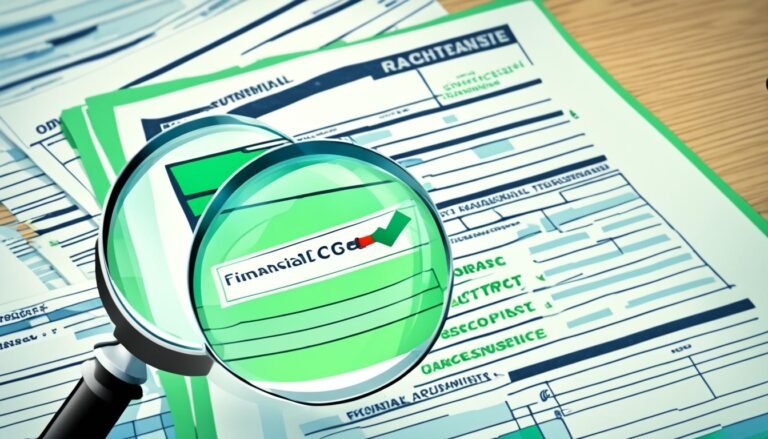Breach Notification Guidelines for Finance Pros
Did you know that financial data breaches are increasing at an alarming rate? According to recent studies, the finance industry experiences a substantial number of data breaches each year, exposing sensitive information and putting individuals at risk.
When a data breach occurs, it is crucial for finance professionals to know the steps to take and whom to contact. The Federal Trade Commission (FTC) provides comprehensive guidelines on breach notification requirements to ensure a proper and effective response to these incidents. By following these guidelines, finance pros can protect their organizations’ data and minimize the impact of a breach on affected individuals.
Key Takeaways:
- Financial data breaches are increasing in frequency and pose a significant risk to individuals and organizations.
- The Federal Trade Commission (FTC) provides breach notification guidelines specifically tailored to the finance industry.
- By adhering to these guidelines, finance professionals can mitigate the impact of breaches and protect sensitive information.
- Proper breach response includes securing operations, assembling a breach response team, consulting with legal counsel, and stopping further data loss.
- Finance pros should also focus on fixing vulnerabilities, identifying data forensics teams, and implementing a robust communications plan.
Secure Your Operations
In order to mitigate the risk of multiple data breaches, it is crucial to secure your systems and fix vulnerabilities that may have caused the breach. By taking proactive measures to safeguard your operations, you can prevent unauthorized access to sensitive data and ensure the protection of your organization’s assets.
Secure Systems and Fix Vulnerabilities
Securing your systems involves implementing robust cybersecurity measures to protect against potential threats. This includes regularly updating software and patching known vulnerabilities. Conducting regular vulnerability assessments and penetration testing can help identify weak points in your system and address them promptly.
It is also important to educate your employees about cybersecurity best practices, such as using strong passwords, avoiding suspicious emails and links, and practicing safe browsing habits. By promoting a culture of security awareness, you can build a strong line of defense against potential breaches.
Secure Physical Areas
Securing physical areas is equally important in maintaining the overall security of your operations. This includes locking sensitive areas, controlling access through key cards or biometric systems, and changing access codes periodically to prevent unauthorized entry.
By implementing strict access control measures, you can limit the risk of physical breaches and ensure that only authorized personnel have access to sensitive areas.
Mobilize Breach Response Team
Having a dedicated breach response team is crucial for effectively addressing and mitigating the impact of a breach. This team should consist of individuals with expertise in various areas, such as IT, legal, and communications.
When a breach occurs, the breach response team should be immediately mobilized to coordinate the response efforts. Their responsibilities may include conducting a thorough investigation, containing the breach, notifying affected parties, and implementing remediation measures. By acting swiftly and decisively, the team can minimize the potential damage caused by the breach.
Remember, securing your operations goes beyond just implementing technical measures. It requires a holistic approach that encompasses both digital and physical security. By taking proactive steps to secure your systems, fix vulnerabilities, secure physical areas, and mobilize a breach response team, you can enhance the overall security posture of your organization and safeguard your valuable assets.
Assemble a Comprehensive Breach Response Team
When a data breach occurs, assembling a comprehensive breach response team is vital to effectively address the breach and minimize further damage. This team should consist of experts from various areas who can provide their unique expertise and perspectives.
Key members of the breach response team may include:
- Forensics Experts: These professionals specialize in digital forensics, conducting investigations to identify the source and scope of the breach. They play a crucial role in collecting and analyzing evidence to understand the nature and extent of the breach.
- Legal Counsel: Consulting with legal professionals who specialize in privacy and data security is essential to ensure compliance with relevant laws and regulations. They can provide guidance on breach notification requirements, legal obligations, and any potential liabilities the organization may face.
- Information Security Specialists: These experts have in-depth knowledge and experience in safeguarding information systems and networks. They can analyze the breach, identify vulnerabilities, and implement measures to prevent future incidents.
- Communication and Public Relations Professionals: Effective communication is crucial during a breach to maintain transparency and manage the organization’s image. They can help craft clear and concise messages to notify affected parties and address their concerns.
- Human Resources Representatives: HR professionals play a vital role in handling internal communications and managing employee-related issues during a breach. They can provide support to affected employees and ensure that any necessary steps are taken to protect their sensitive information.
- Management and Leadership: Executives and key decision-makers need to be involved in the breach response team. Their role is to provide guidance, allocate resources, and make crucial decisions throughout the response process.
By including professionals with expertise in these different areas, the breach response team can navigate the complexities of a breach and ensure a coordinated and effective response.
| Role | Responsibilities |
|---|---|
| Forensics Experts | Conduct digital investigations, identify source and scope of breach, collect and analyze evidence |
| Legal Counsel | Provide guidance on compliance with laws and regulations, breach notification requirements, manage potential legal liabilities |
| Information Security Specialists | Analyze breach, identify vulnerabilities, implement security measures to prevent future incidents |
| Communication and Public Relations Professionals | Craft clear and concise messages, manage external communications, address concerns of affected parties |
| Human Resources Representatives | Handle internal communications, support affected employees, ensure protection of sensitive information |
| Management and Leadership | Provide guidance, allocate resources, make crucial decisions throughout the response process |
Identify a Data Forensics Team
When a data breach occurs, identifying a competent and experienced data forensics team is essential in uncovering the source and scope of the breach. Hiring independent forensic investigators who specialize in data forensics can provide invaluable expertise in capturing forensic images, collecting and analyzing evidence, and outlining the necessary remediation steps.
“Hiring a data forensics team allows for a thorough investigation into the breach, helping organizations gain insights into the specific vulnerabilities that were exploited,” says John Smith, a cybersecurity expert at XYZ Consulting.
These independent forensic investigators play a crucial role in understanding the extent of the breach and guiding the response. They have the knowledge and tools to conduct in-depth investigations, examining log files, network traffic, and other digital artifacts to identify the source of the intrusion and the extent of the compromise.
By leveraging their expertise, organizations can gain a comprehensive understanding of the breach, including how it occurred, what data was compromised, and the potential impact on affected individuals. This information is critical in formulating an effective response strategy and implementing measures to prevent similar incidents in the future.
Here are some key roles and responsibilities of a data forensics team:
- Collecting and preserving evidence: Data forensics experts meticulously collect and preserve digital evidence following proper chain-of-custody procedures. This ensures the integrity and admissibility of the evidence in legal proceedings.
- Performing analysis: Forensic investigators analyze the collected evidence, employing advanced techniques to piece together the sequence of events and determine the root cause of the breach.
- Source identification: Through detailed analysis, the team identifies the initial point of compromise, such as a vulnerable server or an employee’s compromised account.
- Scope assessment: Data forensics experts assess the extent of the breach, identifying the specific data that has been accessed, exfiltrated, or tampered with.
- Providing remediation recommendations: Based on their analysis, the team offers recommendations for mitigating the impact of the breach and strengthening the organization’s security posture.
By engaging a qualified data forensics team, organizations can have confidence in the accuracy and thoroughness of their breach investigation. This not only helps the organization understand the full scope of the breach but also provides valuable insights for improving their overall cybersecurity defenses.
Case Study: Forensic Experts Uncover the Source of a Massive Data Breach
In a recent high-profile data breach incident, a multinational corporation experienced a significant compromise of sensitive customer information. With the reputation of the company at stake, they urgently enlisted the help of an independent data forensics team to investigate the breach.
The forensic investigators meticulously examined the network logs, system configurations, and digital artifacts, leaving no stone unturned in their pursuit of identifying the source of the breach. Through their expertise, they were able to trace the intrusion back to a sophisticated phishing attack that specifically targeted the organization’s senior executives.
The team also discovered that the breach extended much further than initially suspected, with sensitive customer data being exfiltrated over an extended period. Armed with this information, the organization was able to promptly notify affected individuals and take appropriate actions to secure their systems and prevent further damage.
The data forensics team’s comprehensive report not only provided the organization with insights into the source and scope of the breach but also offered recommendations for strengthening their security infrastructure. As a result, the organization has significantly improved its cybersecurity defenses and established measures to prevent similar incidents in the future.
Key Benefits of Hiring Independent Forensic Investigators
| Benefits | Description |
|---|---|
| Expertise | Specialized knowledge and skills in data forensics to conduct thorough investigations. |
| Impartiality | Objective and unbiased approach to uncovering the truth behind the breach. |
| Access to Tools | Advanced tools and technologies for analyzing digital evidence and identifying intrusions. |
| Legal Admissibility | Ensuring the collected evidence adheres to legal standards and is admissible in court, if necessary. |
| Comprehensive Reporting | Detailed reports outlining the breach source, scope, and recommendations for remediation. |
| Post-Breach Improvements | Insights to bolster cybersecurity defenses and prevent future breaches. |
Consult with Legal Counsel
When facing a data breach, it is essential to consult with legal counsel to ensure compliance with federal and state laws. Legal experts with privacy and data security expertise can provide valuable guidance on navigating the breach notification process and understanding the company’s legal obligations.
Privacy and data security laws can vary at the federal and state levels, making it crucial to have legal counsel who understands the intricacies of these regulations. By working with legal experts, companies can ensure they meet all necessary requirements when responding to a data breach.
Legal counsel can provide valuable advice on the proper steps to take, including assessing the breach, determining legal obligations, and preparing the necessary notifications. In addition, they can assist in reviewing contracts and agreements with third-party vendors to ensure compliance with privacy and data security standards.
Consulting with legal counsel is a critical component of an effective breach response. Their expertise in privacy and data security laws can help companies navigate the legal complexities and minimize potential risks.
In addition to legal compliance, legal counsel can also help with reputational risk management and potential legal liabilities. By working closely with legal experts, companies can enhance their response strategy and mitigate the impact of the breach on their reputation and legal standing.
As breaches become more prevalent and the regulatory landscape continues to evolve, seeking legal counsel with privacy and data security expertise is essential. By proactively engaging legal experts, companies can ensure they are well-prepared to manage the legal and regulatory implications of a data breach.
Key Takeaways:
- Consulting with legal counsel is crucial to ensure compliance with federal and state laws implicated by a data breach.
- Legal experts with privacy and data security expertise can guide companies in understanding their legal obligations and navigating the breach notification process.
- Legal counsel can provide valuable advice on assessing the breach, preparing necessary notifications, and reviewing contracts with third-party vendors.
- Engaging legal counsel enhances response strategies, helps manage reputational risks, and mitigates potential legal liabilities.
Stop Additional Data Loss
To prevent additional data loss, it is crucial to take affected equipment offline immediately and closely monitor all entry and exit points. Clean machines should replace affected ones if possible, and credentials and passwords of authorized users should be updated. It is important to remove any improperly posted information from the web to mitigate further risks.
| Actions | Benefits |
|---|---|
| Remove affected equipment | – Prevents further data compromise – Isolates potential security vulnerabilities |
| Monitor entry and exit points | – Identifies potential unauthorized access – Enables timely response to suspicious activity |
| Update credentials and passwords | – Minimizes the risk of unauthorized access – Strengthens overall security posture |
By taking swift action to remove affected equipment, closely monitor entry and exit points, and update credentials and passwords, finance professionals can mitigate the risk of additional data loss. These proactive measures play a crucial role in safeguarding sensitive information and preventing further breaches.
Fix Vulnerabilities
When a data breach occurs, it is crucial to identify and address vulnerabilities to prevent future incidents. This involves examining the access privileges of service providers and ensuring they have implemented adequate security measures.
One key aspect of vulnerability management is analyzing network segmentation. By dividing the network into smaller, isolated segments, the potential spread of a breach can be contained. This strategy limits the impact of unauthorized access and helps protect sensitive data.
Encryption plays a vital role in safeguarding data. By encrypting sensitive information, even if it is intercepted, it remains unreadable to unauthorized individuals. Implementing robust encryption protocols adds an extra layer of security to prevent unauthorized access.
In the event of a breach, having backup data can be critical for recovery and preventing further data loss. Regularly backing up essential information ensures that even if the primary data is compromised, a recent and unaffected copy exists.
Access control is another crucial aspect of vulnerability management. By assessing and adjusting access privileges, organizations can limit the potential for unauthorized parties to access sensitive data. Implementing robust access controls minimizes the risk of data breaches.
| Vulnerability Management Strategies | Benefits |
|---|---|
| Examining access privileges of service providers | Prevents unauthorized access by third parties |
| Implementing network segmentation | Limits the spread of breaches and protects sensitive data |
| Utilizing encryption protocols | Adds an extra layer of security and prevents unauthorized access |
| Regularly backing up data | Ensures recovery options and prevents further data loss |
| Implementing robust access controls | Minimizes the risk of unauthorized access |
Collaborating with forensics experts is crucial during vulnerability management. They can analyze backup or preserved data to assess access control and identify any necessary changes to prevent future breaches.
Have a Communications Plan
Developing a comprehensive communications plan is essential to reach all affected audiences, including employees, customers, investors, and business partners. Clear and transparent communication is key to addressing concerns and providing necessary information to protect individuals from potential harm. Anticipating top-tier questions and offering credit monitoring or identity theft protection can help alleviate concerns.
When a data breach occurs, it is crucial to establish a well-defined communications plan that outlines the strategy for informing all relevant parties about the incident. This plan should consider the different audiences affected by the breach, their specific information needs, and the most effective channels of communication to reach them.
Key Components of a Communications Plan
- Identify the primary and secondary audiences affected by the breach, including employees, customers, investors, and business partners.
- Define the key messages that need to be communicated to each audience, focusing on providing clear and accurate information about the breach, its impact, and the steps being taken to address the situation.
- Determine the most appropriate communication channels for each audience, such as email notifications, website updates, press releases, social media posts, or direct mail.
- Establish a timeline for communication, ensuring that timely updates are provided to keep all parties informed throughout the breach response process.
- Train designated spokespersons on how to effectively communicate with the media and respond to inquiries from the public.
- Anticipate top-tier questions that individuals may have and prepare clear and concise answers to address their concerns.
- Offer credit monitoring or identity theft protection services to affected individuals as a proactive measure to mitigate potential harm.
- Monitor and evaluate the effectiveness of the communications plan, making adjustments as needed to ensure ongoing clarity and transparency.
By having a well-designed communications plan, organizations can provide timely and accurate information to all affected audiences, fostering trust and minimizing the potential damage to their reputation. It is crucial to keep communication channels open throughout the breach response process, ensuring that individuals have the necessary support and resources to safeguard their personal information.
Notify Appropriate Parties
Understanding the legal requirements for breach notification is crucial in the event of a data breach. Any affected businesses, individuals, and law enforcement agencies must be notified as mandated by the state and federal breach notification laws. Prompt and accurate notification plays a vital role in ensuring that affected individuals can take necessary steps to protect themselves and their information.
When it comes to notifying law enforcement, businesses must coordinate with the appropriate agencies to report the breach and provide any necessary information for their investigation. This collaboration helps in identifying and apprehending the perpetrators of the breach, working towards preventing similar incidents in the future.
Moreover, notifying other affected businesses is crucial, as it helps mitigate the potential impact of the breach across multiple entities. By alerting these organizations, they can take immediate action to secure their systems and prevent any further spread of the breach. Sharing relevant details about the breach can also contribute to a collective effort to enhance cybersecurity measures and prevent similar incidents affecting a larger network.
Legal Requirements for Breach Notification
| Legal Requirements | Description |
|---|---|
| State Breach Notification Laws | Each state has its own breach notification laws that establish the requirements, timeline, and thresholds for notifying individuals and government authorities about data breaches. |
| Federal Breach Notification Laws | Federal laws, such as the Health Insurance Portability and Accountability Act (HIPAA) and the Gramm-Leach-Bliley Act (GLBA), impose additional breach notification requirements on specific industries or sectors. |
| Notification Content | The notification should include essential details about the breach, such as the nature of the data compromised, potential risks to affected individuals, and steps they can take to protect themselves. |
| Notification Timelines | Most breach notification laws specify the timeframe within which affected individuals and government authorities must be notified, typically ranging from a few days to a month. |
In conclusion, complying with breach notification laws and promptly notifying the appropriate parties are crucial for affected businesses and individuals alike. By adhering to legal requirements, businesses demonstrate their commitment to transparency and ensuring the protection of individuals’ personal information.
Conclusion
Navigating the complexities of breach notification in the finance industry requires strict adherence to breach notification guidelines and regulations. Following these guidelines, finance professionals can ensure a timely and effective response to cybersecurity incidents, safeguarding the individuals’ personal information.
Compliance with breach notification requirements is of utmost importance. By promptly reporting cybersecurity incidents to the appropriate parties, such as law enforcement, affected businesses, and affected individuals, finance professionals can help mitigate the impact of breaches and aid in the prevention of further harm.
In addition to compliance, effective communication is vital in managing the fallout of a breach. By implementing a comprehensive communications plan, finance professionals can provide clear and transparent information to affected audiences, addressing concerns and offering necessary support. Moreover, anticipating and addressing top-tier questions can help alleviate anxiety and restore trust.
Overall, by adhering to breach notification guidelines, fulfilling reporting obligations, and implementing effective communication strategies, finance professionals can navigate the aftermath of cybersecurity incidents with resilience and protect individuals’ personal information.







